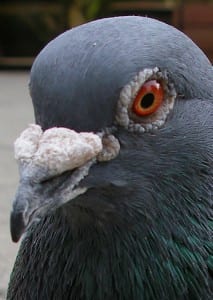
by Pigeon Patrol | Jun 3, 2016 | Bird Netting, Pigeons in the News, UltraSonic Bird Control

A pigeon.
The SPCA is investigating possible pigeon poisoning in Auckland.
The bizarre scene, observed outside Vector Arena in central Auckland on Thursday morning, was attributed by residents to the birds eating a packet of chilli instant noodles.
The ordeal began after the birds began acting strangely in the early morning.
One of the drugged pigeons
Daniel Edwards, who lived nearby, found the sickly birds near a packet of opened instant noodles and spicy seasoning.
“It’s pretty sad. A lot of people hate pigeons, but they don’t annoy me,” he said.
Edwards and his friend chased away two large gulls away that had begun clawing at the incapacitated pigeons.
Daniel Edwards found a dozen sick and dying pigeons in Auckland on Thursday morning.
One pigeon was left with a wound in his side while another bird died.
A passer-by poured water on the distressed birds to help revive them from their sluggish state.
Local resident Cynthia Dickey said this was the third time in three months pigeons had been found in a similar state in the park.
In a previous incident, she said three pigeons died and the SPCA took the remaining 12 away for treatment.
Dickey said the birds were being poisoned by the human food being left scattered around the area.
The chilli seasoning would have been dangerously spicy for pigeons, she said.
“Their little mouths can’t cope with it. It would burn your tongue.”
However, SPCA Auckland chief executive Andrea Midgen said they were investigating if the birds were poisoned.
It was the second callout the SPCA had received to the area in a few months.
“In both cases the pigeons appear to be sick from the use of poison.
“The pigeons found today were particularly sick and had wounds from being attacked by seagulls.”
The birds were taken to NZ Bird Rescue where they were being cared for.
It was legal to poison pigeons in New Zealand but you must ensure the birds don’t suffer and not leave any sick birds behind, she said.
“No animal should be left to suffer like this.”
NZ Bird Rescue Trust spokeswoman Hilary Stollery said they had been alerted to more cases of bird poisoning in recent years.
Cafe owners would poison sparrows and pigeons which were seen as a nuisance, she said.
The Trust would like the practice banned.
Human food can also be toxic to birds, including dry noodles and chili, she said.
“It would expand in the poor creature’s stomach and kill them.”
Human food high in salt and chemicals was also bad for birds.
Anyone wishing to feed birds should give them bird seed, she said.
About Pigeon Patrol:
Pigeon Patrol Products & Services is the leading manufacturer and distributor of bird deterrent (control) products in Canada. Pigeon Patrol products have solved pest bird problems in industrial, commercial, and residential settings since 2000, by using safe and humane bird deterrents with only bird and animal friendly solutions. At Pigeon Patrol, we manufacture and offer a variety of bird deterrents, ranging from Ultra-flex Bird Spikes with UV protection, Bird Netting, 4-S Gel and the best Ultrasonic and audible sound devices on the market today.
Voted Best Canadian wholesaler for Bird Deterrent products four years in a row.
Contact Info: 1- 877– 4– NO-BIRD (www.pigeonpatrol.ca)
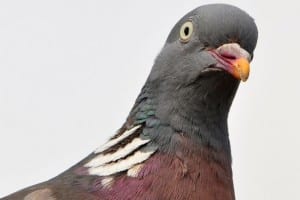
by Pigeon Patrol | May 30, 2016 | 4-S Gel Bird repellent, Bird Netting, Pigeon Patrol's Services, UltraSonic Bird Control
 Council orders staff to investigate ways to eliminate pigeon roosting at the Canada Summit Centre entrance.
Council orders staff to investigate ways to eliminate pigeon roosting at the Canada Summit Centre entrance.
HUNTSVILLE – Pigeons have been steadfastly opposing the municipality.
Pigeon control program in…
Despite the concerted effort of staff, pigeons have been roosting in large numbers at the entrance to Huntsville’s Canada Summit Centre. At the Dec. 21 council meeting, a motion was passed to escalate the town’s efforts in deterring the fowl.
Kari Lambe, executive director of community services and economic development, explained to council that there have been numerous attempts made to keep the birds from the Summit Centre and they have all been thwarted.
“We have tried a number of things in the past. We’ve tried the fake owls. We currently have the spikes. We even have the spikes serviced on a regular basis because the pigeons actually try to bump the spikes off and try to build nests on top of the spikes,” said Lambe.
“Pigeons actually try to bump the spikes off.”
– Kari Lambe
The pigeon issue has had serious consequences for the municipality. According to Lambe, staff members are routinely at the Summit Centre entrance dealing with it, which takes away from time they could be spending else where.
Scott Aitchison, mayor of Huntsville, said the whole problem has been exasperated by people within the municipality.
“I believe there are a number of well-meaning citizens feeding the pigeons at the Summit Centre. That’s probably not helping the situation,” said Aitchison.
Council voted to direct staff to investigate further options for keeping the pigeons away from the entrance.
About Pigeon Patrol:
Pigeon Patrol Products & Services is the leading manufacturer and distributor of bird deterrent (control) products in Canada. Pigeon Patrol products have solved pest bird problems in industrial, commercial, and residential settings since 2000, by using safe and humane bird deterrents with only bird and animal friendly solutions. At Pigeon Patrol, we manufacture and offer a variety of bird deterrents, ranging from Ultra-flex Bird Spikes with UV protection, Bird Netting, 4-S Gel and the best Ultrasonic and audible sound devices on the market today.
Voted Best Canadian wholesaler for Bird Deterrent products four years in a row.
Contact Info: 1- 877– 4– NO-BIRD (www.pigeonpatrol.ca)
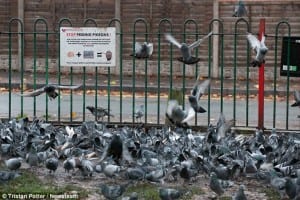
by Pigeon Patrol | May 27, 2016 | Bird Netting, UltraSonic Bird Control
 The North Platte City Council may close the coop on North Platte’s pigeon problem.
The North Platte City Council may close the coop on North Platte’s pigeon problem.
The council will discuss authorizing an agreement with the United States Department of Agriculture, Animal and Plant Health Inspection Service to “reduce the numbers of pigeons roosting and loafing in the city,” according to a copy of the agreement included in the agenda for the Jan. 5 meeting.
The agreement would create a wildlife damage management program to control the populations of pigeons, European starlings and English house sparrows within the city. The agreement states that use of a pellet rifle is effective in population control for all three bird species, as is trapping and euthanization, use of pesticides and nest removal.
The program would run in partnership with private businesses and entities agreeable to sharing the cost of the agreement. The private entities are not determined at this time.
Cost of the service is estimated at $7,499.
n The council will consider an extension request for Community Development Block Grants used for improvements in three areas of northwest North Platte. A letter from Tom Werblow, city engineer, to Judy Clark, city grants administrator, recommends an extension to Oct. 15. The city contracted with Cement Products on paving projects on 18th Street from Sheridan to Jackson avenues, 13th Street from Carr to Madison avenues and 15th Street from Custer to Sheridan avenues.
“We recommend caution in allowing Cement Products to bid on the next Block Grant project,” Werblow wrote in the letter.
His warning was because of Cement Products’ performance with the CDBG and NDOR projects, according to the letter.
n A vendor for Verizon Wireless, Unite Private Networks, has requested the city authorize them to use city utility poles. The company wants to attach “small cells” to the poles, which are intended to enhance cell phone networks and reduce the need for traditional cell phone towers.
An overview of the service from the company explains that small cells are used in an area already covered by a cell tower to assist in high bandwidth areas such as schools, shopping centers, airports and special events.
About Pigeon Patrol:
Pigeon Patrol Products & Services is the leading manufacturer and distributor of bird deterrent (control) products in Canada. Pigeon Patrol products have solved pest bird problems in industrial, commercial, and residential settings since 2000, by using safe and humane bird deterrents with only bird and animal friendly solutions. At Pigeon Patrol, we manufacture and offer a variety of bird deterrents, ranging from Ultra-flex Bird Spikes with UV protection, Bird Netting, 4-S Gel and the best Ultrasonic and audible sound devices on the market today.
Voted Best Canadian wholesaler for Bird Deterrent products four years in a row.
Contact Info: 1- 877– 4– NO-BIRD (www.pigeonpatrol.ca)

by Pigeon Patrol | May 26, 2016 | Bird Netting, UltraSonic Bird Control
 It’s 10 minutes before noon and Ustad Anil Sood is ready. Dressed in a crisp white shirt and trousers, he puts on a black sleeveless jacket, a golden bracelet and watch, and rushes all the way up a spiral, dingy flight of stairs in his five-storey building. He is headed to the roof — his playground, like that of over a thousand other “kabootarbaaz” in this part of Old Delhi.
It’s 10 minutes before noon and Ustad Anil Sood is ready. Dressed in a crisp white shirt and trousers, he puts on a black sleeveless jacket, a golden bracelet and watch, and rushes all the way up a spiral, dingy flight of stairs in his five-storey building. He is headed to the roof — his playground, like that of over a thousand other “kabootarbaaz” in this part of Old Delhi.
He has been on this roof, flanked by the historic Gurdwara Sis Ganj Sahib and Jama Masjid, “jab se maine hosh sambhala hai (since I gained consciousness)”, says the 45-year-old. The family has a construction business, which takes care of their “khaana-peena”, but kabootarbaazi is what gives them their “josh (zeal)”, Sood says.
In Agra last week, a six-day contest of kabootarbaazi was stopped following objections from the Animal Welfare Board of India, on grounds of cruelty to pigeons.
Over here in Old Delhi, in the midst of the peak December-March season, Sood is unflappable as he prepares his pigeons for their contests of the day. Kabootarbaazi was popularised in India by the Mughals, and Sood’s family, as per his estimation, has been participating in it “for over hundred years”. “It’s a passion,” he repeats, “a part of purani Delhi tradition.”
There are eight enclosures in all on the roof, holding about 100-150 pigeons each, from Hyderabad, Lucknow, Patiala and Delhi. Sood walks up to the enclosures and, for the next few minutes, talks to his pigeons — some “baat-cheet”, he says, to prep them.
A ‘shagird’ stands at the gate of the enclosure holding the Hyderabadi pigeons. Around 12.30 pm, Sood raises his left arm, the shagird flings open the gate, and the batch of 150 Hyderabadi pigeons — ivory-coloured with a few specks of grey, each with a name, and with tiny, special ghungroo (anklets) on their feet — are off, in a not-so-pretty rush.
At the same moment, from the roof of another building, two lanes away, an ustad releases his batch of “Lakhnawi” pigeons. The first kabootarbaazi game of the day is on.
This is a race, with the ustad whose pigeons fly the farthest from his roof to be declared the victor.
Sood isn’t worried. “In Kinari Bazaar, there are 12 ustads. My pigeons win most contests,” he smiles.
There is no money involved in these daily competitions, he clarifies. “But many ustads organise professional contests from time to time where the winner gets anything between Rs 1,000-50,000.”
One is crowned an ustad at an elaborate ceremony, involving the tying of a pagdi (turban). Sood’s brother, 42-year-old Arjun, is still a khalifa, a rank between a shagird and an ustad. Shagirds train under an ustad, and Sood has six with him today.
Sood points out the single black pigeon in his flock, now already some distance away. “That is my trademark. By it, people know these are my birds.”
All eyes now on the two rival flocks, Sood picks up his tool — a “chapka (wooden stick with a net)” — while the shagirds and khalifas get their sticks with red cloth tied to them. Then they begin the shouting. “The idea is to ensure that the pigeons don’t return to the roof and fly further away. Also, they must fly opposite to the wind, otherwise they are disqualified,” says Sood, making loud, throaty cries.
There are broad smiles as Sood takes another look at the sky and tells you which part of the city his pigeons are in — Sadar Bazaar. That is 2 km away.
On the other roof there is growing anger, as the Lakhnawi pigeons have started returning. The aggression palpable now, Sood and his team start shouting expletives to keep the pigeons away. “They (the pigeons) are like children, they need to be trained. It’s like accelerating a vehicle,” says a 14-year-old shagird.
Around 1.30 pm, Sood’s father Ram Kishan (75) comes to the roof. As he takes out his more robust tools — a big steel plank and an iron rod — one of Sood’s pigeons suddenly appears on the railing of the roof.
Kishan begins thumping the plank. Alarmed, the pigeon zooms off. Kishan says that was Chandna. “Usko badhazmi ho gai hai, thodi sust bhi hai (Her stomach’s upset, she is lazy too), but this is a strict sport.”
Few know pigeons better than Kishan, who makes two trips a year to markets across India to purchase the birds for his “team”. “The jungli (wild) pigeons come for as little as Rs 100, but each of my pigeons cost me nothing less than Rs 1,000.”
Elaborating what they look for, he adds, “The beak must be of one colour, even the body shouldn’t have mixed colours. We like the Hyderabadi and Irani breeds, all white and beautiful.”
The “training” begins when the pigeons are around three years old. “The pigeons are at their fittest and fastest then,” says Sood.
Later, after the game, Kishan holds Chandna’s feet and shakes them, and puts a net on top of her for a few minutes. “This is how we punish them. It’s like pulling a child’s ear,” he explains.
By now, the sky is full of pigeons. “Those near Jama Masjid belong to Muslim kabootarbaaz. We have competitions with them too, there is no religious rivalry,” says Sood.
His contest won, Sood raises his right arm and shrieks “Aaaoooo” — a cue for the pigeons to get back. In a twinkling of ghungroos, the birds fly in, and go straight for the mix of almonds and walnuts, grains and ghee that Arjun has sprinkled on the floor.
“They need a special diet, they are racers. This diet ensures they fly far and fight the winds,” he says watching with pride.
Explaining the anklets, Sood says, “They are just to enhance beauty. They come in many varieties too. The ones from Delhi have pearls, the Hyderabadi ones have metallic beads…”
The pigeons are still eating when, minutes later, Sood signals to one of the khalifas to fling a shoe in their middle. The stunned pigeons fly up again. “This is real training, so that they know I am the master,” says Sood.
His pigeons take on rival flocks two more times in the next one hour, winning each time. Satisfied, Sood finally calls the racers back.
At 3 pm, the tired pigeons get their “energy drink”. Sood grinds raw turmeric, dry ginger and other “jadi bootis (medicinal herbs)” together on a stone platform, and mixes their juice into a pot of lukewarm water for the birds. “Every ustad has a secret recipe,” he says. “We go to a hakim (unani doctor) to get the mix.”
After they have had their fill, the Hyderabadi pigeons are led into their enclosures — and they go in unprotesting.
However, for Sood, the second part of the day is only just beginning. For this, he takes out his “Patialas”— brown and grey pigeons, bigger and tougher, and “not as beautiful” as the Hyderabadis. As the birds are released with special sounds again, the rules are different. This flock’s aim is to take on the one from the neighbouring roof. The mission: to ensure your birds are not scared on to the opponent’s roof.
Arjun believes what happened in Agra stemmed from this. “An ustad lost 400 pigeons in fighting and complained to the police.”
The other side has pitted Hyderabadi pigeons against his Patialas. After a 10-minute bout, Sood shouts out “Ho!”, a signal for the birds to return. Suddenly an eagle appears in the mix, and his team’s fears come alive. One of Sood’s team members shouts “lagiya” — signalling that one of their pigeons was moving towards the other roof. Quickly, the screams get hoarser and Kishan begins beating the steel plank even more frantically. The contingency plan works, the pigeon flies back.
“Izzat ka sawal tha (It was a question of honour),” Sood smiles relieved. There are two more such 10-minute bouts in a game.
Arjun says it’s not the eagles that are the biggest threat. “It is the Chinese manjha (the string used for kite-flying that injures birds). This is the season of patangbaazi (kite-flying) too.”
The rounds of kabutarbaazi continue till pigeons in all their eight enclosures have had their time in the sky.
As they begin to pack up, Kishan dismisses suggestions that the sport may be dying. “My father, grandfather, each one was a kabootarbaaz. In Old Delhi, the excitement around the sport is growing.”
He can also tell you why. “After school, I know where my children will be — on the roof, playing with pigeons. It is better than smoking or drinking.” Sood smiles sheepishly and says his children are at tuitions.
As he looks down below, at the cacophony and rush that mark the narrow lanes of Kinari Bazaar in Chandni Chowk, where time has long stood still and down which his children will soon be returning, Sood tells you what he and his pigeons find on the roof on such sunny winter afternoons: “freedom”.
About Pigeon Patrol:
Pigeon Patrol Products & Services is the leading manufacturer and distributor of bird deterrent (control) products in Canada. Pigeon Patrol products have solved pest bird problems in industrial, commercial, and residential settings since 2000, by using safe and humane bird deterrents with only bird and animal friendly solutions. At Pigeon Patrol, we manufacture and offer a variety of bird deterrents, ranging from Ultra-flex Bird Spikes with UV protection, Bird Netting, 4-S Gel and the best Ultrasonic and audible sound devices on the market today.
Voted Best Canadian wholesaler for Bird Deterrent products four years in a row.
Contact Info: 1- 877– 4– NO-BIRD (www.pigeonpatrol.ca)
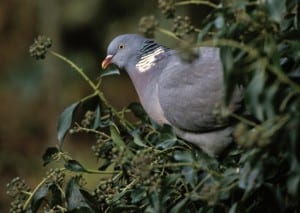
by Pigeon Patrol | May 18, 2016 | Bird Netting, Pigeon Spikes, Pigeons in the News, UltraSonic Bird Control
 JAIPUR: A study coordinated by Sawai Man Singh (SMS) Medical College made a startling revelation that pigeons could cause serious respiratory diseases. They said even air-coolers were harmful for lungs.
JAIPUR: A study coordinated by Sawai Man Singh (SMS) Medical College made a startling revelation that pigeons could cause serious respiratory diseases. They said even air-coolers were harmful for lungs.
Feeding pigeons is fine, but constant exposure to them could invite serious diseases like hypersensitivity pneumonitis (HP), says a recent national study coordinated by Sawai Man Singh (SMS) Medical College.
“At least 22% of cases of HP had history of bird (pigeon) exposure,” said Dr Sheetu Singh, assistant professor, Institute of Respiratory Diseases, SMS Medical College, and coordinator, ILD India Registry – a perspective database (March 2012-April 2015).
“Another major finding of the study shows that around 48.8% patients with HP in the registry had exposure to air-coolers,” Dr Singh said.
In Jaipur, pigeons have homes in flats and apartments. Pigeons’ droppings and nesting could be found easily in heritage buildings, flats, apartments, government buildings, which forces residents of the city to remain exposed to such environmental conditions. Over the past few years, more pigeons are being spotted everywhere. “Pigeons’ droppings or pigeon-affected environment is not good for lungs,” Dr Singh said, while talking about the findings of the study.
The ILD India registry is a set of data collected for the very first time in the country from 19 cities including Jaipur by 27 investigators. They managed to collect clinical data from 1,090 patients. In Rajasthan, 400 patients were found suffering from ILD, but the figures could be even higher. The findings further say, “A vast majority of ILD patients (47%) enrolled in this registry were diagnosed with HP, an inflammatory-fibrotic lung disease, caused by inhalation of environmental factors and 71% of patients with HP lived in urban areas.”
The details of the breakthrough findings were presented by former SMS superintendent Dr Virendra Singh in a session during NAPCON 2015, on Friday, and discussed by a panel of experts during the session that was moderated by Dr Ganesh Raghu, director, Centre for ILD, sarcoid and pulmonary fibrosis program, Seattle, USA.
The experts discussed that since the disease is usually unrecognised, one can avoid its progression by preventing further exposure to such environment or surroundings either at home or work place. The findings from the results of the analyses of data gathered by the participating site pulmonologists from their consenting patients across India, is an eye-opener and has implications not only for the public and physicians in India but provides useful insights into the field of ILD in general.
About Pigeon Patrol:
Pigeon Patrol Products & Services is the leading manufacturer and distributor of bird deterrent (control) products in Canada. Pigeon Patrol products have solved pest bird problems in industrial, commercial, and residential settings since 2000, by using safe and humane bird deterrents with only bird and animal friendly solutions. At Pigeon Patrol, we manufacture and offer a variety of bird deterrents, ranging from Ultra-flex Bird Spikes with UV protection, Bird Netting, 4-S Gel and the best Ultrasonic and audible sound devices on the market today.
Voted Best Canadian wholesaler for Bird Deterrent products four years in a row.
Contact Info: 1- 877– 4– NO-BIRD (www.pigeonpatrol.ca)
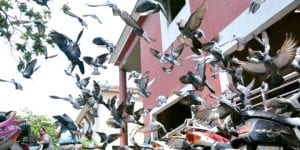
by Pigeon Patrol | May 17, 2016 | 4-S Gel Bird repellent, Bird Netting, UltraSonic Bird Control
 Researchers Andrew Biewener and David Williams of Harvard University have uncovered the reason for the seemingly impeccable flight abilities of pigeons – they can make choices on what flying technique to follow when faced with an obstacle.
Researchers Andrew Biewener and David Williams of Harvard University have uncovered the reason for the seemingly impeccable flight abilities of pigeons – they can make choices on what flying technique to follow when faced with an obstacle.
Scientists and engineers have studied the flight patterns of pigeons, which, despite a great presence in the city where major unnatural path blocks are present like buildings and cars, rarely crash compared to other birds like robins.
The duo set up an area with video cameras and pre-planted obstacles made of plastic pipes, which the pigeons have to fly over in order to get their meal. Upon review of the videos, the two researchers observed that the pigeons perform two techniques when passing through an obstacle. The more amazing part is how the pigeons are able to decide on which technique is the better choice, based on the distance of the obstacle they had to pass through, according to Phys.Org.
The pigeons had to scrunch their bodies in order to pass through the obstacles. However, for obstacles with a distance of at least half a wing apart, the pigeons opted to lift their wings as if to flap, but when they approached the obstacle, their wings “paused” so that they didn’t hit the plastic pipes. When the pipes were much closer, the pigeons opted to pull their wings into their body – a technique that presents a higher chance of losing altitude, but greatly protects the birds from wing damage.
Biewener and Williams believe that the ability of the pigeons to choose what technique to follow is a deliberate act. This means the birds are able to intelligently made a decision before passing through the obstacles, which is something rare since birds in general are not known to be an “intelligent” species.
About Pigeon Patrol:
Pigeon Patrol Products & Services is the leading manufacturer and distributor of bird deterrent (control) products in Canada. Pigeon Patrol products have solved pest bird problems in industrial, commercial, and residential settings since 2000, by using safe and humane bird deterrents with only bird and animal friendly solutions. At Pigeon Patrol, we manufacture and offer a variety of bird deterrents, ranging from Ultra-flex Bird Spikes with UV protection, Bird Netting, 4-S Gel and the best Ultrasonic and audible sound devices on the market today.
Voted Best Canadian wholesaler for Bird Deterrent products four years in a row.
Contact Info: 1- 877– 4– NO-BIRD (www.pigeonpatrol.ca)




 Council orders staff to investigate ways to eliminate pigeon roosting at the Canada Summit Centre entrance.
Council orders staff to investigate ways to eliminate pigeon roosting at the Canada Summit Centre entrance.
 The North Platte City Council may close the coop on North Platte’s pigeon problem.
The North Platte City Council may close the coop on North Platte’s pigeon problem.
 JAIPUR: A study coordinated by Sawai Man Singh (SMS) Medical College made a startling revelation that pigeons could cause serious respiratory diseases. They said even air-coolers were harmful for lungs.
JAIPUR: A study coordinated by Sawai Man Singh (SMS) Medical College made a startling revelation that pigeons could cause serious respiratory diseases. They said even air-coolers were harmful for lungs.
 Researchers Andrew Biewener and David Williams of Harvard University have uncovered the reason for the seemingly impeccable flight abilities of pigeons – they can make choices on what flying technique to follow when faced with an obstacle.
Researchers Andrew Biewener and David Williams of Harvard University have uncovered the reason for the seemingly impeccable flight abilities of pigeons – they can make choices on what flying technique to follow when faced with an obstacle.